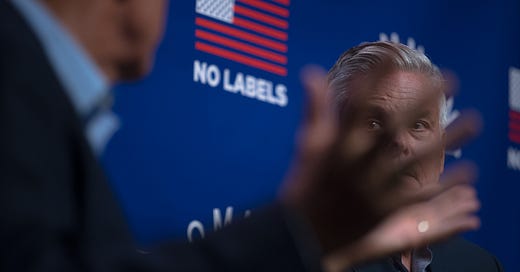The No Labels Scheme: Not Just Dangerous But Undemocratic
The group intends to promote a candidate picked not by primary voters but by elites at a private convention.

THE LEADERS OF THE GROUP No Labels are working feverishly in all fifty states to get ballot access for a third-party presidential candidate next year.
As has been widely remarked, that gambit is likely to result not in the selection of the next president but in a spoiler candidate. Yet it is also worth noting more generally what the No Labels scheme would mean for our democratic system: It would roll the clock back on a half century of reforms by both major parties to democratize the way we select presidential candidates, to make the process more transparent, and to create new pathways for insurgent candidates to pursue the highest office in our land—all goals No Labels claims to support.
Unlike the two major parties, No Labels plans no primaries or caucuses that allow tens of millions of Americans to participate in choosing their nominee. The organization remains curiously vague about its nominating process, saying only that it will hold a convention in Dallas next spring.
A small private convention, funded by secret money, with self-selected delegates, as No Labels proposes, is not a step toward more democracy and transparency.
Who will attend this private convention? No Labels won’t say, but it’s likely to be wealthy donors and a few hundred, at most, self-selected delegates.
Will the people at this convention represent all the states or just big donor states like California, Texas, and New York? We don’t know.
Who will pay for getting ballot access and holding their national convention? We don’t know. The donors are secret. No Labels won’t disclose them.
Despite seeking ballot access as a political party, No Labels operates as a tax-exempt social welfare organization that doesn’t have to disclose wealthy donors as political parties do.
IN 1968, SENATORS ROBERT F. KENNEDY AND EUGENE MCCARTHY dominated the Democratic primaries, but at the party’s convention in Chicago, Vice President Hubert Humphrey, who did not compete in any primaries but had the support of party bosses, won the nomination. His nomination led to one of the most contentious conventions in American history, with riots in the streets of Chicago.
The Republicans that year nominated former Vice President Richard Nixon, who competed in only a handful of primaries and won fewer primary votes than California Governor Ronald Reagan.
Ever since, both parties have opted to have nominees chosen by voters in primaries and caucuses rather than by insiders in clandestine meetings in “smoke-filled rooms.” In 2020, even during the pandemic, nearly 37 million voters participated in the Democratic primaries and caucuses that nominated President Biden. In 2016, the last contested Republican primary fight saw more than 31 million voters participate in the process that picked former President Trump as the nominee.
No Labels leaders say they must pick their own candidate because voters need more choices. That is simply not true. All of their potential candidates are either Republicans or Democrats. All could enter their party’s primaries and let the voters decide their fate. Since third-party candidates never win—and won’t win in 2024—winning a major-party nomination is a much more realistic path for a No Labels adherent to win the White House.
The parties’ modern primary processes are wide open to insurgent candidates—just look at the recent history of presidential elections. Five of our last eight presidents were not the first choice of party insiders when their campaigns began but found a pathway to the presidency through the primaries. Washington insiders barely knew Jimmy Carter, and virtually none supported him. Ronald Reagan challenged a sitting president in the 1976 primaries before winning the Republican nomination four years later. In 1992, insiders thought Bill Clinton was part of the Democrats’ B Team. Barack Obama and Donald Trump were not favorites of their party’s establishments.
I have some personal insight into Clinton’s candidacy. In 1985, Clinton was among a group of elected officials who created the insurgent Democratic Leadership Council, of which I was founder and CEO, to redefine the Democratic party and reshape American politics. We challenged the orthodoxies of both political parties. Insiders mocked the DLC as not being real Democrats.
As DLC chairman in 1990 and 1991, Clinton shaped a new agenda for our country and the Democratic party. He took that agenda into the 1992 Democratic primaries and won his party’s nomination because the voters supported him and his ideas. As president, he enacted most of his ideas into law.
That’s the way insurgencies succeed in our democratic system.
The No Labels leaders just released their agenda for the country. If they have a candidate willing to carry that agenda, they should follow the Clinton-DLC model. Let Joe Manchin or Larry Hogan or whoever else they may support vie for the nominations of their parties. If one or both prevailed, they would have a reasonable chance of winning and actually implementing their ideas.
The presidential primary process is long and grueling. But it tests whether a candidate and his or her ideas can withstand months of intense scrutiny in ways exclusive meetings cannot.
Taking the nomination of presidential candidates away from the voters will not further our democracy. Anointing a nominee at a private convention of self-chosen insiders and donors will produce a spoiler, not a winner.
And—again—a third-party candidate in 2024 would risk throwing the election to Donald Trump, who promises every day to undermine our system of government. No Labels says it wants to avoid that outcome. That’s why it should abandon its third-party effort right now.





